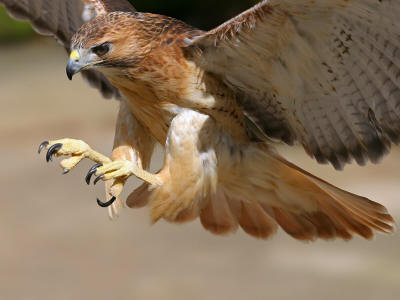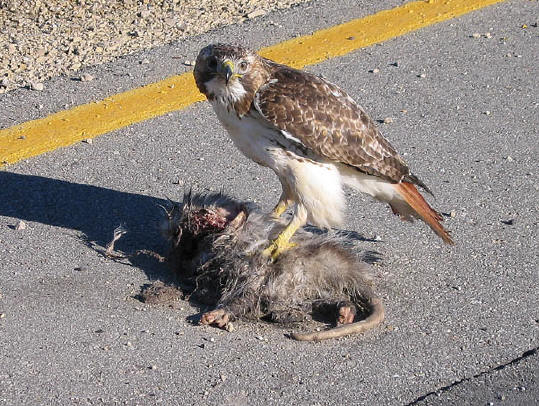Preventing raptor road-kill
Tim Iverson
Seasonal Naturalist
Cunningham Falls State Park
 (6/2014) Believe it or not it had been a rather pleasant afternoon commute up 270-N. I had been following the same sedan for some miles now. As any good driver does my eyes made the circuit from looking ahead through the windshield, up to the rearview mirror, over to the side view
mirrors, and every now and again to check the time and speed I was going. After one of these rounds I make it back to staring forward, and I catch a glimpse of a hand fling something out of the driver’s side window. The yellow and slender skin with arms flailing in the wind made it abundantly clear what they had tossed aside. It couldn’t have been anything other than a banana
peel. Big deal you might be asking yourself. Well, I am here to tell you that it IS a big deal.
(6/2014) Believe it or not it had been a rather pleasant afternoon commute up 270-N. I had been following the same sedan for some miles now. As any good driver does my eyes made the circuit from looking ahead through the windshield, up to the rearview mirror, over to the side view
mirrors, and every now and again to check the time and speed I was going. After one of these rounds I make it back to staring forward, and I catch a glimpse of a hand fling something out of the driver’s side window. The yellow and slender skin with arms flailing in the wind made it abundantly clear what they had tossed aside. It couldn’t have been anything other than a banana
peel. Big deal you might be asking yourself. Well, I am here to tell you that it IS a big deal.
At seven state parks across Maryland there are aviaries housing injured wildlife that will never be able to return to the wild because they can no longer care for themselves as the result of human caused injuries. The closest to our area is located at Cunningham Falls State Park. Within this aviary are animals, most of who have been hit by cars. These
accidents could largely be avoidable. Most think of roadside litter as trash bags, empty fast food bags, cups and containers, and other kinds of junk. When presented with the idea of banana peels or apple cores or other natural and biodegradable things they think it’s perfectly natural and fine to toss them aside as they please. However, this is not the case. The raptors
living in Maryland Park Service aviaries can provide ample evidence as to why.
Let’s meet a Red Tailed Hawk for just a minute. This beautiful bird of prey is the largest hawk that lives in Maryland. This bird prefers wide open spaces, primarily fields. In fact, if we’re being honest this is probably one species that has benefited from deforestation and development. They feast on small mammals like mice, rabbits, squirrels, and
smaller birds in their territory. You can often see them sitting on the sides of roadways. They’re usually perched upon telephone poles, over head lights, or signs. They are naturally drawn to these areas because of high perch places, and the abundance of prey.
You see rodents are naturally attracted to any type of food trash. It doesn’t matter if that fast food bag is empty or not, because it still smells like French fries and burgers. Empty wrappers still retain the scent of whatever food they packaged as well. Banana peels, apple cores, or other food waste will still attract prey like mice to the sides of
roadways in search of a quick meal. Red-tailed Hawks, and other birds of prey, know this and will wait for prey to arrive. Then when the moment is right they’ll strike. They swoop down from on high to claim their catch. Often times though it’s not that simple. They are competing with the tumult of traffic which can be chaos to process for wildlife. Raptors frequently are
struck by cars in the process of hunting. In most cases these birds are killed on impact. A lucky few who do survive and make it to medical assistance in time may be able to fully recover and be rereleased to the wild. However, the majority of those who are hit and survive will not be able to go back. These reasons can vary: wing amputations, which makes flight impossible;
brain damage, which makes hunting and survival impossible; or loss of vision in one or both eyes, which makes hunting, flying, and surviving difficult to impossible.

For those birds that are fortunate enough to survive, but cannot survive on their own will be placed in zoos and aviaries throughout the county. The Maryland Park Service has a program called Scales & Tales which cares for and houses wildlife like this. Scales & Tales is an environmental education program that provides people the opportunity to see
these wild animals up close. By relating the "tale" or story of the animals the Maryland Park Service can reach out to the public and educate them on environmental issues of concern. These issues range from environmental pollution, climate change, habitat and resource loss, invasive species, and more. There are a few ways people can help these animals as well as wildlife.
The first way is by visiting these aviaries, parks, and wild spaces in general. By raising your awareness you are likely to make lasting lifestyle changes and be able to spread the message to others. Scales & Tales also has an adoption program that allows you to symbolically "adopt" these animals, and the money goes towards their care and well being.
The best way to help them is to help prevent unnecessary injuries from happening in the first place. Practicing Leave No Trace is a great way to start.
Leave No Trace is a non-profit organization and a set of principles or ethics regarding how we use and treat the great outdoors. These seven ideas are easy to follow and very reasonable. They are:
- Plan Ahead & Prepare – Make sure you pack all necessary food, gear, etc. Know you’re way so you don’t get lost. Most importantly, plan for how to pack your waste and bring it back with you
- Travel/Camp on Durable Surfaces – When you hike or camp off of specific or regulated areas you destroy vegetation that prevents rain runoff and destroy habitat by expanding human impact
- Dispose of Waste Properly – If you brought it there, then make sure you bring it back.
- Leave What You Find – This way another passerby can experience what you did
- Minimize Campfire Impacts – If there are existing fire rings then use them! Otherwise the woods will be pockmarked with blackened scorched earth
- Respect Wildlife – Respect all wildlife, but remember some wildlife can be venomous or dangerous so if you don’t respect them they will not respect you.
- Be Considerate of Other Visitors – You’d hate it if you were soaking up the beauty of the outdoors and someone was being loud, rude, and disruptive. Don’t do it to someone else.
Leave No Trace can usually be summed up by the adage, "Take only pictures, leave only footprints." By practicing these principles in all of our outdoor affairs we can assure that every one of us can always enjoy what the wild lands have to offer. Just like you try to take care of your personal stuff, we need to take care of our collective stuff.
Throwing the banana peel out instead of waiting to find a trash can is reckless. It endangers wildlife by setting them up for disaster. When this happens often enough the scavengers eating it become accustomed to the food source, and may starve when or if it is no longer available. The simple act of just waiting a few more minutes is well worth the investment to preserve the
independent and natural order of things. I once saw a road sign while working for the National Park Service in Big Bend Texas that I think I’d like to leave you with – Litterin’ is unlAWFUL! Make sure the impact you leave behind is a positive one.